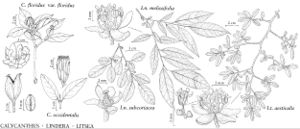Difference between revisions of "Calycanthus floridus var. floridus"
FNA>Volume Importer |
FNA>Volume Importer |
||
| Line 32: | Line 32: | ||
|elevation=0-1850 m | |elevation=0-1850 m | ||
|distribution=Ala.;Fla.;Ga.;Md.;Miss.;N.C.;Pa.;S.C.;Tenn.;Va. | |distribution=Ala.;Fla.;Ga.;Md.;Miss.;N.C.;Pa.;S.C.;Tenn.;Va. | ||
| − | |discussion=<p><i>Calycanthus floridus </i>var.<i> floridus</i> grades into <i></i>var.<i> glaucus</i> in northeastern Alabama, northwestern Georgia, and southeastern Tennessee, where determination to variety is not always possible. <i>Calycanthus</i> brockianus was distinguished primarily by having green flowers instead of maroon, although flowers with greenish or green-tipped tepals are occasionally seen on maroon-flowered plants of both varieties of <i>C. floridus</i> and <i>C. occidentalis</i>. Viable seeds were produced after self-pollinations of plants identified as C. brockianus, but not after crosses with <i>C. floridus </i>var.<i> floridus</i> or when insects were excluded (R. J. Ferry Sr. and R. J. Ferry Jr. 1987). Agamospermy has been noted in both varieties of <i>C. floridus</i> (K. A. Nicely 1965), and pollination is required for the development of the endosperm (C. E. Wood Jr. 1958). <i>Calycanthus</i> brockianus may therefore represent agamospermous triploids within diploid populations of <i>C. floridus</i>. Studies of cytology and of reproductive biology of plants identified as C. brockianus are necessary for determination of the status of that taxon.</p> | + | |discussion=<p><i>Calycanthus floridus </i>var.<i> floridus</i> grades into <i></i></i>var.<i><i> glaucus</i> in northeastern Alabama, northwestern Georgia, and southeastern Tennessee, where determination to variety is not always possible. <i>Calycanthus</i> brockianus was distinguished primarily by having green flowers instead of maroon, although flowers with greenish or green-tipped tepals are occasionally seen on maroon-flowered plants of both varieties of <i>C. floridus</i> and <i>C. occidentalis</i>. Viable seeds were produced after self-pollinations of plants identified as C. brockianus, but not after crosses with <i>C. floridus </i>var.<i> floridus</i> or when insects were excluded (R. J. Ferry Sr. and R. J. Ferry Jr. 1987). Agamospermy has been noted in both varieties of <i>C. floridus</i> (K. A. Nicely 1965), and pollination is required for the development of the endosperm (C. E. Wood Jr. 1958). <i>Calycanthus</i> brockianus may therefore represent agamospermous triploids within diploid populations of <i>C. floridus</i>. Studies of cytology and of reproductive biology of plants identified as C. brockianus are necessary for determination of the status of that taxon.</p> |
|tables= | |tables= | ||
|references= | |references= | ||
| Line 56: | Line 56: | ||
|publication year= | |publication year= | ||
|special status=Endemic;Selected by author to be illustrated | |special status=Endemic;Selected by author to be illustrated | ||
| − | |source xml=https://jpend@bitbucket.org/aafc-mbb/fna-data-curation.git/src/ | + | |source xml=https://jpend@bitbucket.org/aafc-mbb/fna-data-curation.git/src/f6b125a955440c0872999024f038d74684f65921/coarse_grained_fna_xml/V3/V3_850.xml |
|genus=Calycanthus | |genus=Calycanthus | ||
|species=Calycanthus floridus | |species=Calycanthus floridus | ||
Revision as of 19:55, 24 September 2019
Twigs pubescent. Petiole and abaxial surface of leaf blade pubescent.
Phenology: Flowering late spring, fruiting mid fall.
Habitat: Deciduous or mixed woodlands, along streams and rivers, margins of woodlands
Elevation: 0-1850 m
Distribution

Ala., Fla., Ga., Md., Miss., N.C., Pa., S.C., Tenn., Va.
Discussion
Calycanthus floridus var. floridus grades into var. glaucus in northeastern Alabama, northwestern Georgia, and southeastern Tennessee, where determination to variety is not always possible. Calycanthus brockianus was distinguished primarily by having green flowers instead of maroon, although flowers with greenish or green-tipped tepals are occasionally seen on maroon-flowered plants of both varieties of C. floridus and C. occidentalis. Viable seeds were produced after self-pollinations of plants identified as C. brockianus, but not after crosses with C. floridus var. floridus or when insects were excluded (R. J. Ferry Sr. and R. J. Ferry Jr. 1987). Agamospermy has been noted in both varieties of C. floridus (K. A. Nicely 1965), and pollination is required for the development of the endosperm (C. E. Wood Jr. 1958). Calycanthus brockianus may therefore represent agamospermous triploids within diploid populations of C. floridus. Studies of cytology and of reproductive biology of plants identified as C. brockianus are necessary for determination of the status of that taxon.
Selected References
None.
